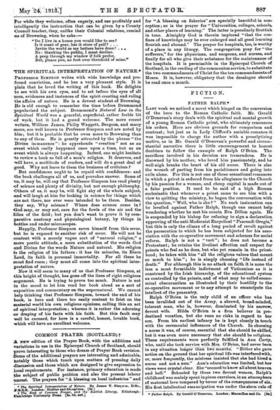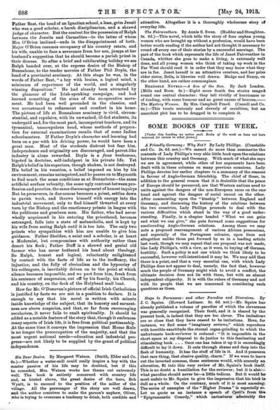FICTION.
FATHER RALPH.•
LAST week we noticed a novel which hinged on the conversion of the hero to the Roman Catholic faith. Mr. Gerald O'Donovan's story deals with the spiritual and mental growth of a young Roman Catholic priest, who ultimately renounces his orders. Here are obvious grounds for comparison and contrast ; but just as hi Lady Clifford's amiable romance it was impossible to charge the author with a proselytizing motive, so in Mr. Gerald O'Donovan's powerful and circum- stantial narrative there is little encouragement to honest doubters to follow the example of Ralph O'Brien. the sacrifices involved in his decision are tremendous. He is disowned by his mother, who loved him passionately, and he well-nigh breaks the heart of his old nurse. There is also the wrench of parting from his parishioners and going into exile alone. For this is not one of those sensational romances in which a priest is seduced from his allegiance to the Church by his passion for a woman, and cheap capital is made out of a false position. It used to be said of a high Roman ecclesiastic that whenever a priest came to see him with a view to quitting the ministry, he began the conversation with the question, " Well, who is she ?" No such insinuation can be levelled against Father Ralph, though one cannot help wondering whether he met his cousin Eva Dillon again. He is suspended by his bishop for refusing to sign a declaration approving of the anti-Modernist Encyclical " Pascendi Gregis," but this is only the climax of a long period of revolt against the persecution to which he has been subjected for his asso- ciation with the co-operative movement and schemes for social reform. Ralph is not a " vert "; he does not become a Protestant; he retains the liveliest affection and respect for priests who feel as he does, but who yet remain in the priest- hood; he takes with him "all the religious values that meant so much to him"; he is simply choosing "life instead of death." For although this is no attack on faith it is none the less a most formidable indictment of Vaticanism as it is construed by the Irish hierarchy, of the educational system as controlled by the priests, and of what may be called econo- mical obscurantism as illustrated by their hostility to the co-operative movement or to any attempt to emancipate the intellect of the peasantry.
Ralph O'Brien is the only child of an officer who has been invalided out of the Army, a shrewd, broad-minded, tolerant man, who is, however, dominated by his narrow, devout wife. Hilda O'Brien is a firm believer in pre- destined vocation, but she runs no risks in regard to her son. From his earliest infancy he is kept closely in touch with the ceremonial influences of the Church. In choosing a nurse it was, of course, essential that she should be skilled, but it was even more necessary that she sbould be religious. These requirements were perfectly fulfilled in Ann Carty, who, until she took service with Mrs. O'Brien, had never been in any situation longer than two months: "Either she gave notice on the ground that her spiritual life was interfered with, or, more frequently, the mistress insisted that she had hired a nurse and not a nun." Ann's education was limited, but her views were crystal clear. She "seemed to know all about heaven and bell." Schooled by these two devout women, Ralph's; childhood was mainly spent in pious exercises, in an atmosphere of maternal love tempered by terror of the consequences of sin. His first intellectual emancipation was under the stern rule of • Father Ralph. By Gerald O'Donovan. Loudon: Katmai= and Co. [Bet] Father Best, the head of an Ignatian school, a lean, grim Jesuit who was a good scholar, a harsh disciplinarian, and a- shrewd judge of character. But the contest for the possession of Ralph between the Jesuits and Carmelites—to the latter of whom Mrs. O'Brien inclined—ends in the disappointment of both. Major O'Brien resumes occupancy of his country estate, and his wife, unable to face a severance from her son, jumps at her husband's suggestion that he should become a parish priest in their diocese. So after a brief and exhilarating holiday we see Ralph banded over, at the express desire of the Bishop of Bunnahone, to the tender mercies of Father Phil Doyle, the head of a provincial seminary. At this stage he was, in the words of Father Best, " a boy with brains, a logical mind, a minimum of experience of the world, and a singularly winning disposition." He had already been attracted by the glamour of the Irish-speaking campaign, and had learned something of the aims of the co-operative move- ment. He had been well grounded in the classics, and was accustomed to refinement and comfort in his home. The picture of life at Bunnahone seminary is vivid, circum- stantial, and repulsive, with its unwashed, ill-fed students, its underpaid and, for the most part, incompetent teachers, and its tyrannical, unscrupulous head, whose methods of prepara- tion for external examinations recalls that of some Indian schoolmasters. If Father Doyle's character and learning had been on a par with his driving power, he would have been a great man. Most of the students distrust but fear him. Independence and originality are discouraged, and parrot-like industry is alone rewarded. Doyle is a faux bonhomme, bigoted in doctrine, self-indulgent in his private life. Yet Ralph's belief in his superiors, though shaken, is not destroyed. His belief in his vocation, a belief imposed on him by his environment, remains unimpaired, and be passes on to Maynooth to find much the same conditions as at Bunnahone—the same artificial surface urbanity, the same ugly contrast between pro- fession and practice, the same discouragement of honest inquiry, But he perseveres, in due course becomes a priest, settles down to parish work, and throws himself with energy into the industrial movement, only to find himself thwarted at every turn by the Bishop and the reactionary priests in league with the publicans and gombeen men. His father, who had never wholly acquiesced in his entering the priesthood, becomes estranged, falls into a state of melancholia, and is kept by his wife from seeing Ralph until it is too late. The only two priests who sympathize with him are unable to give him guidance. Father Sheldon, a saint and a scholar, is at heart a Modernist, but compromises with authority rather than desert his flock ; Father Duff is a shrewd and genial old farmer who has never bothered his head about theology. So Ralph, honest and logical, reluctantly enlightened by contact with the facts of life as to the inefficacy, the injustice, and the folly of clericalism and the hypocrisy of his colleagues, is inevitably driven on to the point at which silence becomes impossible, and we part from him, fresh from his sentence of suspension, cut of by his family, his Church, and his country, on the deck of the Holyhead mail boat.
How far Mr. O'Donovan's picture of official Irish Catholicism is justified by facts we are not in a position to declare. It is enough to say that his novel is written with minute inside knowledge of the subject, that its honesty and earnest- ness are above suspicion, and that, so far from encouraging secularism, it never fails to exalt spirituality. It should be added as a notable feature of the story that, though it embraces many aspects of Irish life, it is free from political partisanship. At the same time it conveys the impression that Home Rule is no longer the preoccupation of the majority, and that the most urgent national needs—education and industrial pro- gress—are not likely to be supplied by the grant of political independence.











































 Previous page
Previous page